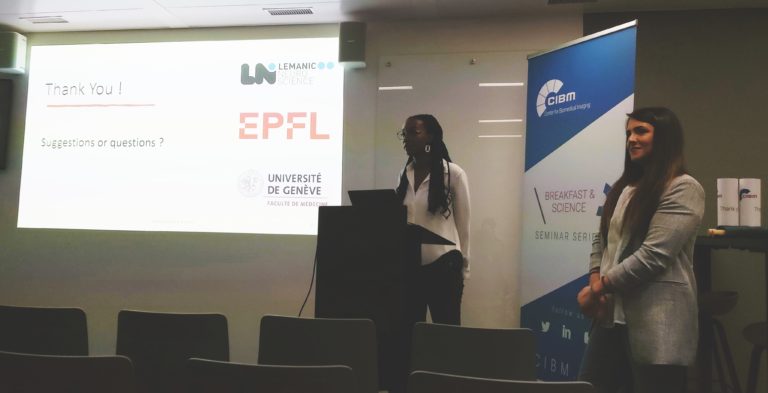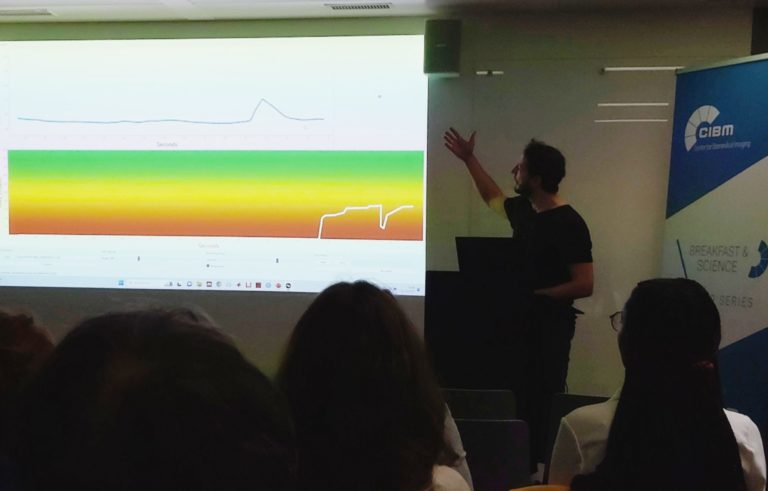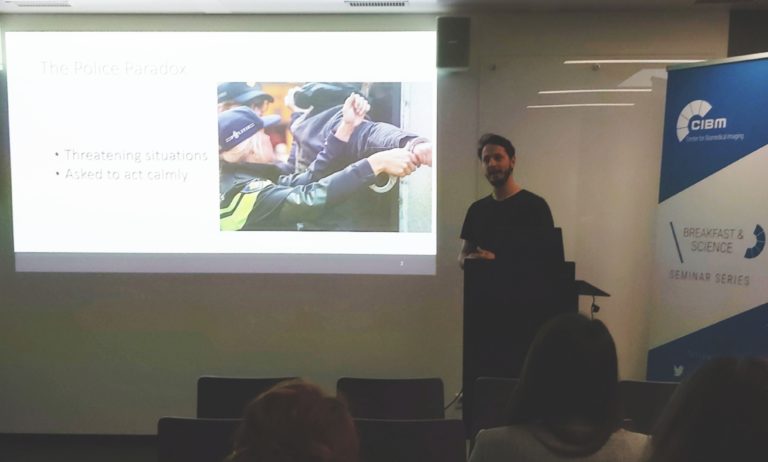On the 31st of October 2023, the 38th CIBM Breakfast & Science Seminar chaired by Maria Guilia Preti, CIBM SP EPFL UNIGE section and Tomas Ros, CIBM EEG HUG UNIGE section hosted two student speakers.
Aïda Fall,
PhD candidate, Lemanic Neuroscience Doctoral School, Geneva, Switzerland
Consistent brain network centrality patterns are associated with APOE4 at different stages of Alzheimer’s disease
Abstract:
Functional brain change in Alzheimer’s Disease (AD), as revealed by functional magnetic resonance imaging (fMRI), is characterized by disruption of neuronal brain networks. Carrier status of the ApolipoproteinE4 (APOEE4) allele is associated with faster progression of AD, and therefore a potentially more pronounced disintegration of brain functional connectivity (FC). In our study, we investigate FC changes associated with carrying the ApoE4 allele, to link individual brain network properties with AD risk. We included in the study 137 participants from the Alzheimer’s Disease Neuroimaging Initiative database (ADNI) and grouped them based on their ApoE4 carrier status (54 carriers vs. 83 non-carriers), as well as their clinical status (42 Cognitive Normal (CN), 38 Subjective Memory Complaint (SMC), 44 Mild Cognitive Impairment (MCI), 13 Alzheimer’s Disease dementia (AD). The aim of our study is to provide a better understanding of the brain’s functional connectivity (FC) in individuals having the genetic risk factor APOE4. Our principal hypothesis is that individuals with at least one APOE4 allele present a different brain FC compared to non-carriers and that consistent APOE4-associated differences in brain connectivity can be observed at all stages of AD. In this talk, I will overview: 1) how we investigated the differences of eigenvector centrality of brain regions between the ApoE4 carriers and the ApoE4 non-carriers and 2) how we explored the progression of the disease, translated as the clinical group belonging, to see whether it has an impact on functional connectivity.
About the speaker:
Aïda Fall is a PhD student at the Lemanic Neuroscience Doctoral School in Geneva. Her focus consists of investigating the link between Alzheimer’s disease genetic risk factors and functional brain changes at various disease stages.
She was granted an award from the Fondation Jean-Falk Vairant for a 6-month graduate research training at McGill University in Montréal, Canada under the supervision of Prof Nathan Spreng in 2023.
Supervisors: Prof Paul G. Unschuld, Dr Maria Giulia Preti, Prof Dimitri Van de Ville
Abele Michela,
PhD candidate, Behavioral Science Institute, Radboud University, Nijmegen, The Netherlands
The heart on duty: Training police officers in action using a biofeedback virtual-reality game
Abstract:
Adequate control over evolutionary-engrained bodily stress reactions is essential to avoid disproportionate responses during highly arousing situations for police officers. Heart rate variability biofeedback is a widely-used intervention aiming to improve stress regulation, but typically conducted under passive, low-arousing conditions. In this presentation, I will outline the benefits of integrating HRV biofeedback via a closed-loop system in an engaging action game format, a first-person Virtual-Reality Go-No/Go game, to train in-action physiological self-control under high arousal. Additionally, I will review how combining biofeedback training with action can enhance our capacity to monitor and understand biofeedback training, and its impact on transfer to real-life situations.
About the speaker:
Abele Michela is a PhD candidate at the Radboud University Nijmegen. The focus of his work is mainly on intervention Science (Neuro- and Biofeedback).
He will defend his PhD in January, presenting a project centered on the use of in-action HRV biofeedback, delivered in a VR environment, to help police officers keep in control under threat.
Supervisor: Dr Floris Klumpers, Prof Isabela Granic, Prof Karin Roelofs
RECORDINGS
PHOTO GALLERY
The monthly meet-up seminar series is a great environment to ask questions or to share insights on challenges and solutions. It’s also a good way to broaden and enrich professional networks.
Revisit past seminars and stay tuned for the CIBM Breakfast and Science Seminars in 2024.






